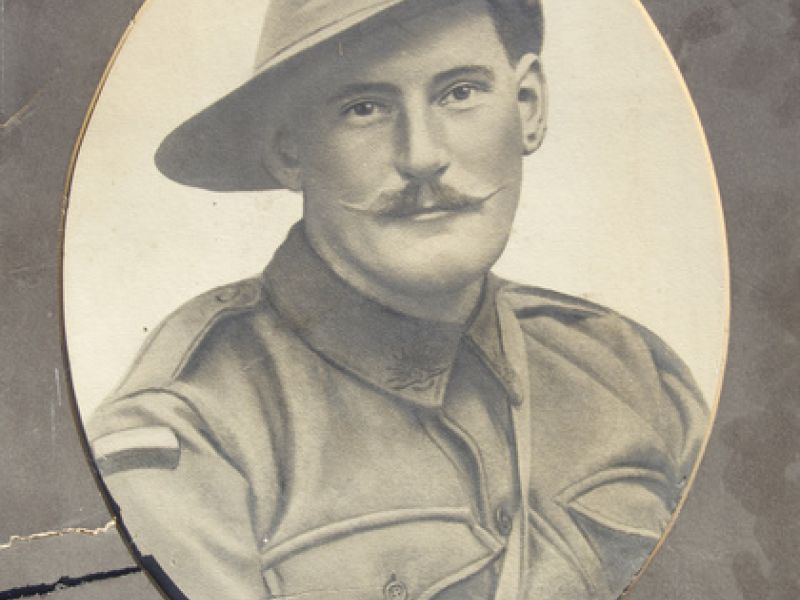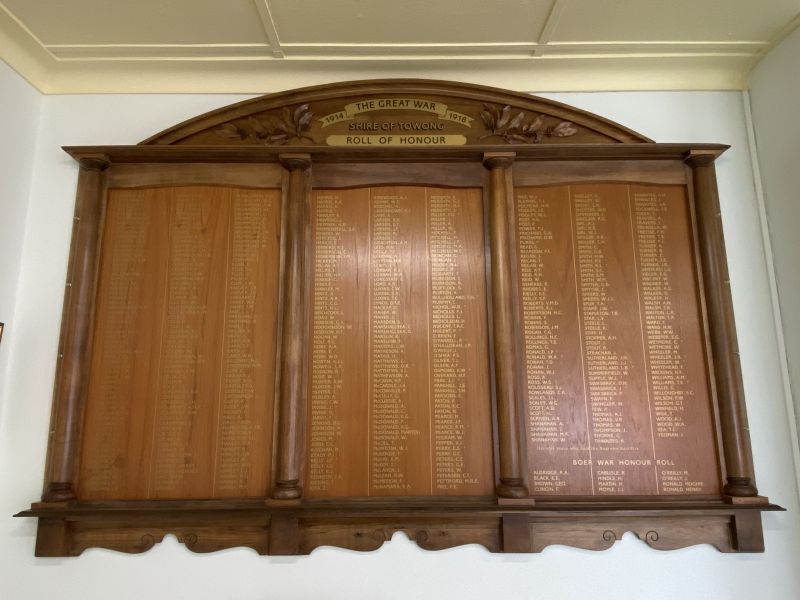John (Jack) James Sutherland
Jack was born in 1888 at Thologolong Station in Victoria. He was the eldest of eleven children to Peter Alexander and Thomasina (Ina) Mary Eliza (née Carter) Sutherland.
On the 10th of July, 1915, members of the Granya local community attended a recruitment meeting. Prior to the meeting, Jack, Arnold and Ben, the eldest sons of the Sutherland family, drew lots to see who would enlist. Jack and Ben ‘won’, although, as Ben was under the age of twenty-one, he needed his parents to give their consent to enlist. A cousin of Ina’s, Jack Anderson, also enlisted with the two Sutherland boys.
Both Jack and Ben were prolific writers and they received many letters and parcels from their relatives back at home. In one of Jack's letters, dated May 1916, he described the conditions in one of his letters home.
“The rats are pretty thick in some of the houses we have been billeted in - they are running over us all night. The people here take things very cooly. They are putting their crops in right up to the trenches and the women and kids walk about as if nothing was up, although four kiddies were killed by a shell the other day about a mile from where we are billed.”
A month later, back in the trenches, Jack wrote home again.
“Expect to be out again for a spell soon. A German raiding party came over the other night but we gave them what they were looking for. We did not have any casualties but they left about a dozen dead in front of our barbed wire. Three of our chaps went out and brought one of them in - he was a Bavarian and was tangled up in the wire and as full of holes as a sieve. He was a fine stamp of a man.”
On ANZAC Day 1917, Jack was wounded during an attempt to capture one of the Channel sports of Le Havre, Calais and Boulogne. He wrote to his parents in late April:
“Just a few lines to let you know that I am doing well and that the wound is very slight - a bullet through the flesh front of the left shoulder. It did not hurt as much as having a tooth pulled, so don’t worry about me, Mum, as I am alright and having a good spell. Give my love to the Girls, Maud and Arn and the kiddies, and remember me to the Collins and Hores. We are having fine weather over her lately, a bit of a change from the rain. Please excuse this scrawl, dears, but this is a very bad pencil.”
Four days later he wrote:
“I am getting on splendidly and expect to be going to Blighty [England] in a few days. I am walking about and the wound is healing up fine … Don’t worry about me, as I am all right - it is only a flesh wound. I suppose I got too careless. I was sniping Fritz and forgot that he might try sniping as well, anyhow I had some fine shooting first and the knock he gave me would not have killed a sparrow.”
On May the 3rd, after arriving in England, he was transferred to the Lewisham Military Hospital, followed by another transfer, this time to Weymouth Military Hospital. Jack wrote to his family explaining that he would not be going to France for a while as his shoulder was too stiff to carry a pack. What Jack had been describing to his family in Australia as a “flesh wound” the Australian Army in France classified it as “a severe gunshot wound to the shoulder”. Clearly Jack was trying not to worry his family too much.
On the 30th of November he rejoined his battalion at the front. In 1918, on the 16th of April, he was gassed and wounded again four days later. He rejoined his battalion on the 27th of June.
On the 8th of August the 8th Battalion participated in the Allies offensive which was launched near Amiens. The advance by British and empire forces was the greatest success in a single day on the Western front. German General Erich Ludendorff described it as “the black day of the German Army in the war.” Jack was once again wounded, this time very seriously, with shrapnel wounds to the abdomen, right leg and left thigh. On the 11th of August he died as a result of those wounds.
Jack was buried in Vignacourt British Cemetery, Picardie, France with the service being conducted by the Rev. G. Boycott who was attached to the 61st Casualty Clearing Station. He is also remembered on the Australian War Memorial Roll of Honour, and the Towong Shire Boer War and WW1 Roll of Honour. For his service during the war he was awarded the 1914/15 Star, the British War Medal, and the Victory Medal.

 Stephen Learmonth
Stephen Learmonth